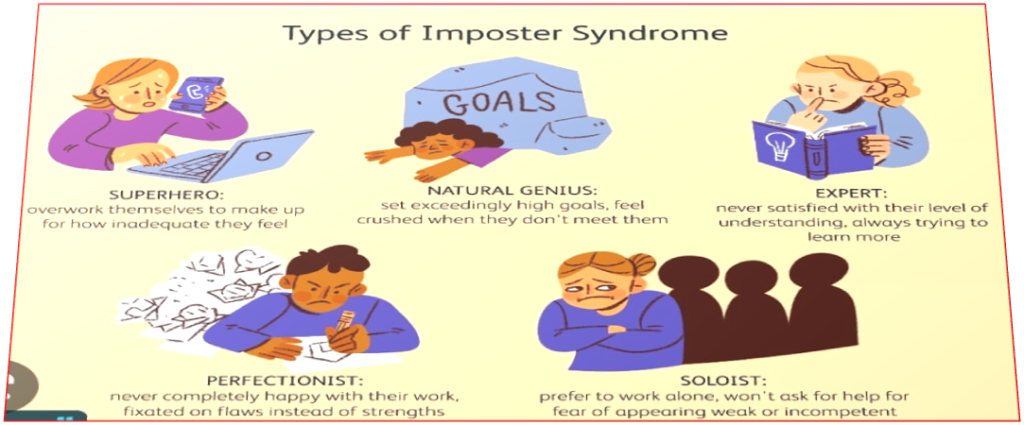Self-Doubt Or Lack Of Confidence? Understanding Imposter Syndrome

Many individuals have experienced feeling like they don’t belong, or they don’t deserve their accomplishments, even when they have worked hard to achieve them. Imposter syndrome is a phenomenon that can manifest in various ways, such as persistently fearing exposure as a fraud or doubting one’s abilities despite evidence to the contrary. Imposter syndrome can affect anyone, regardless of their level of success, and can cause significant distress and self-doubt. In this article, we will explore imposter syndrome and its synonyms, including understanding its causes and how to overcome it.
In this modern competitive world, it is necessary to prove oneself continuously at home, relationships, work, social & business circle. What if it becomes engulfing, arduous, and toilsome to face, accept and fulfill even the iota of demands at work, business, society or to oneself? What if doubts and thoughts inundated with fear, worry, dearth of confidence & motivation pop up often? For example, “My boss must be thinking that I am good for nothing & really did a mistake by hiring me. I am sure they are already in the process of firing me”.
When individuals label themselves as a fraud or a phony due to self-doubt or fallacy, it often triggers a cascade of negative emotions, known as “Feeling like a fraud”. Consequently, they experience this kind of cognitive distortion, which is an internal psychological experience of being unable to savor success despite objectively performing at a high level. By frequently self-doubting their true abilities, they might struggle to recognize their achievements. In turn, this can lead to feelings of inadequacy, imposter syndrome, and a lack of confidence in themselves.Continuous feelings of restlessness, nervousness, inadequacies, symptoms of anxiety/depression often convoy Imposterism at home, workplace, vocation or business or social relationships.

The Imposter Syndrome shows up in five different forms;
- The Perfectionist (hungry for success, higher prestige & feels unsatisfied no matter how good they achieve),
- The Superwoman/man. (not only willing to work overtime but also trying to prove of being capable of handling anything to get endorsement at workplace),
- The Soloist. (not willing to ask for help & resent others, as seeking help makes them feel getting exposed of not knowing enough),
- The Natural Genius (cherish putting minimal effort into their work & succeeding, pride on being quick-slick in getting things done) and;
- The Expert. (exhibits a compulsive need to have all the knowledge, credentials, and experience even before applying for a vocation or work).
People attribute the causes to a very demanding upbringing and family environment with a whopping stress on accomplishments or being too critical of abilities, as well as social pressure while being a fragment of a social circle, where the expectation of anything or everything needs approval of being worthy and overt achievements. Besides, diversity & biases at workplace with discriminatory views, policies based on race, socioeconomic class, religion, gender, &tokenism intensifies self-doubt by questioning one’s abilities & self-worth. Finally, there are some personality traits meant to internalize feelings of pressure, doubt, and failure.
Ways to deal with Imposter Experience:
- Positive Intelligence assessment can help expose sabotaging voices that are holding you from progress.
- Two column exercise list. “Evidence of being inadequate” & “Evidence of being competent” can help one to understand the right picture. They can be done by gathering, acknowledging,& reflecting on proof of competency.
- Focusing on inner values than outward success or achievements.
- Understand that one can’t grow, learn, or progress without failures.
- Get out of rumination, a pattern of circling thoughts by talking to someone or jotting down fears.
- Be self-compassionate & inundate yourself with credit, motivation, appreciation for wherever you have reached so far.
- Embrace & learn from losses or failures.
- Mindfulness meditation. Use the SBNRR (Stop, Breath, Notice, reflect, Respond) mindfulness technique. They use to pause, re-evaluate & recognize your strengths.
- Welcome feedback from trustworthy circle: A periodic open & meaningful feedback from dependable circle will help in thrashing out negative labels by yourself or anyone else.
It is imperative to understand that imposter syndrome poses overwhelming self-doubts and inadequacies. Impostor feelings are the inability to enjoy success and often shuns opportunities that would eventually let oneself flourish and sparkle.
